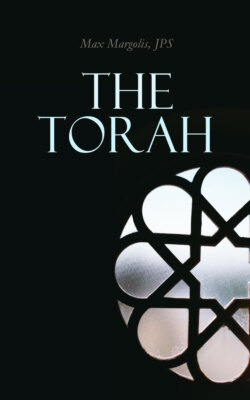The Torah

Реклама. ООО «ЛитРес», ИНН: 7719571260.
Оглавление
Max Margolis. The Torah
The Torah
Table of Contents
TORAH – INTRODUCTION
Name
Quinary Division of the Torah
Division into Sections
Jewish Tradition and the Torah
Preexistence of the Torah
Study of the Torah
Criticism of the Torah Among Jews
Composition
Style
Laws of the Torah
Penal Law
Civil Law
GENESIS (Bereshit)
EXODUS (Shemot)
LEVITICUS (Vayiqra)
NUMBERS (Bemidbar)
DEUTERONOMY (Devarim)
Отрывок из книги
Max Margolis, JPS
The Hebrew Teaching: Genesis, Exodus, Leviticus, Numbers & Deuteronomy
.....
The spirit of criticism naturally developed from this devotion to the Pentateuch, in spite of faith and reverence. The very existence of the doctrine that the Law was of heavenly origin, and that whosoeverdenied this dogma had no share in the life to come (Sanh. x.), shows that there was a school which assumed a critical attitude toward the Torah. There is much evidence in proof of this; but here only the history of criticism within the orthodox synagogue will be discussed. It was a moot point whether the Law was given all at once or in smaller rolls at different times (Giṭ. 60a); and the further question was discussed, whether Moses or Joshua wrote the last eight verses of the Pentateuch (B. B. 14b-15a). It was definitely affirmed, on the other hand (ib.), that Moses composed the sections concerning Balaam (Num. xxii.-xxiv.), thus closing all discussions on that score. Many tacit doubts are scattered through the Talmud and Midrash, in addition to those which Einstein has collected. In the post-Talmudic period, in like manner, there was no lack of critics, some of them recognized as such again only in recent times, although Abraham ibn Ezra, who was joined by Spinoza, has long been recognized as belonging to this class.
The composition of the Torah should be discussed on the basis of the old Semitic concepts, which planned a work of literature practically rather than systematically. Repetitions, therefore, should not be eliminated, since things which are good and noble may and should be brought to remembrance many times. From the point of view of effective emphasis, moreover, a change of context may develop a new and independent application of a given doctrine, especially if it be repeated in other words. Thus tradition (The Thirty-two Rules of Eliezer b. Jose ha-Gelili) took "the repeated doctrine" as its rule of interpretation, and left large numbers of repetitions (parallel passages) in its collections of oral teachings. The framework of the Pentateuch is historical narrative bound together by the thread of chronology. There is no rigid adherence to the latter principle, however; and the Talmud itself accordingly postulates the rule: "There is no earlier and no later in the Torah" (Pes. 6b et passim). From a Masoretic point of view, the Mosaic code contains the history of a period of about 2,300 years. As has already been noted in regard to the names of the individual books, the Talmud and the Masorah divided the Torah into smaller units according to its contents, so that Genesis includes the story of Creation and of the Patriarchs, Exodus the account of the departure from Egypt, the revelation, and so on.
.....